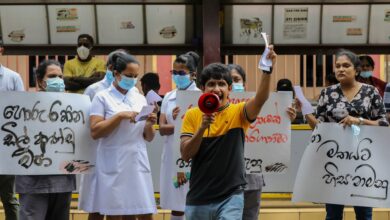Suu Kyi’s waning leadership in young Myanmar democratic opposition

By Eric San Juan
Ho Chi Minh City, Vietnam, Mar 2 (EFE).- Deprived of liberty and isolated since last year’s military coup, ousted Myanmar leader Aung San Suu Kyi has been losing strength as an icon in recent months as the young democratic junta opposers look beyond the idolatries of the past.
“I get the impression that the young generation doesn’t care about Suu Kyi. She practically has no role right now,” Hein, a 25-year-old activist who cut short his dream of becoming a filmmaker, told EFE by phone from Mandalay (the country’s second largest city.)
The leader, revered in Myanmar for decades and whose party won en masse at the polls, has disappeared from the public scene since her arrest during the Feb. 1, 2021 coup and faces several closed-door court proceedings whose hearings continued this week.
Like many young people who came of age in the midst of a democratic transition, Hein began to feel disappointed in the 76 year old when she refused to criticize the military campaign of ethnic cleansing against the Rohingya. This ethnic group has been historically discriminated against, and she had to justify the army’s role before the International Criminal Court in The Hague.
“I stopped caring when I saw that she did not defend the Rohingya,” said the young man, adding that he considers Suu Kyi “a lesser evil” compared to the military regime imposed since the coup and speaking about her lack of action in the weeks leading up to the putsch.
“Since December 2020 it was rumored that the military was going to stage a coup. Why didn’t you do anything to stop it? (…) When the coup happened, the main claim was to free Suu Kyi. And now it gives me the impression that people don’t care about leaders anymore,” he said.
Hunter Marston, International Relations expert at the Australian National University, told EFE that “the dissident movement is much broader than Suu Kyi’s former resistance against the military.”
“Suu Kyi still plays an important role and is still a key figure in the opposition. She has the nominal post of State Counselor. But I think the actors trying to bring about change are now leaning on a much broader base,” he said. Marston, who highlights the emergence of issues such as federalism and the rights of ethnic minorities.
Although she kept a tireless struggle for decades to bring democracy to her country, the deposed leader did so in a limited way, hardly giving a voice to the dozens of ethnic minorities who spent decades demanding more rights and a federal state that allows them to maintain their cultural identity.
However, the National Unity Government, formed underground as a parallel executive to that of coup leader Gen. Min Aung Hlain, has assembled a more diverse team, including members of ethnic minorities. It has recognized that the Rohingya should have equal rights to any Myanmar citizen, something Suu Kyi always avoided doing.
“I think the (parallel government) had to make some concessions to show that it was serious about democracy and gain the support of ethnic minorities who don’t trust Suu Kyi. They see her as an extension of the army because of her long-standing cooperation with them,” Martson said.
It is very likely that Suu Kyi herself is not aware of these movements or of almost anything that has happened in her country in the last 13 months, since she is barely granted permission to speak for a few minutes with her lawyers to prepare for court hearings.
“She is isolated and excluded from what happens in her country,” said Marston, who added that her isolation is one of the keys to her loss of prominence.
Arrested since the morning of the coup, the most important accusations faced by the deposed leader are the violation of the Official Secrets Law, electoral fraud and four cases of corruption punishable by up to 15 years in prison.
The first sentences for lower-ranking infractions have already been pronounced: two years (after the partial pardon of the military junta) for incitement against the military junta and breaking Covid-19 pandemic laws and four years for the illegal importation of walkie talkies.
The coup, which the army justified on alleged electoral fraud by Suu Kyi’s party, has plunged Mynmar into a deep political, economic and social crisis in which 1,585 people have died due to the repression of authorities and has fueled and reopened armed conflicts countrywide. EFE
esj/lds





